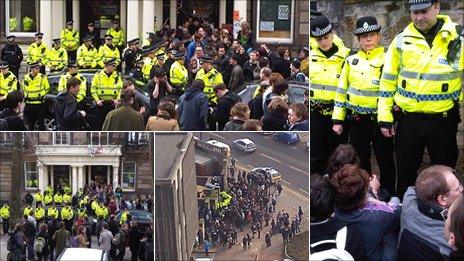Glasgow University eviction of students 'heavy handed'
- Published

An operation to evict student protesters from Glasgow University has been condemned as "heavy handed".
Glasgow Student Representative Council said more than 80 officers, 18 police vehicles and a helicopter had been used during the removal of 15 students.
They occupied the Hetherington Research Club for seven weeks in protest at cuts designed to save £20m by 2014.
Strathclyde Police said any suggestion the response was disproportionate was "frankly ridiculous".
The university called police after a protest was staged in response to its own efforts to clear the site.
'Jeopardising plans'
A spokesman for the university said: "The university has previously written to the last remaining students occupying the Hetherington Building asking them to bring their protest to a peaceful conclusion.
"Since then, many students have left the occupation. But the continuing presence of occupiers in No 13 University Gardens was putting at risk plans the university has to refurbish the accommodation and to develop it for academic use.
"University staff entered 13 University Gardens this morning and asked the remaining occupiers to leave."
He said police had been asked to attend when a group of protesters gathered outside.
"The occupiers left the building peacefully, and there were no serious incidents," the spokesman added.
The operation to remove the remaining students started on Tuesday morning when campus security moved into the occupied Hetherington building.
Police arrived and the situation escalated into a major stand-off involving hundreds of students and dozens of officers.
Supt Nelson Telfer said: "Strathclyde Police was called at 1030 hours this morning by staff at Glasgow University to ask for assistance in dealing with an ongoing protest.
"When officers arrived, we were notified that there were a small number of people inside one of the university buildings, with a crowd of around 20 people outside. This number quickly rose to around 150 throughout the course of the morning and into the early afternoon.
"No arrests were made during the protest, however, as a result of inquiries, one female has been arrested for an alleged obstruction.
"She was taken to the Western Infirmary Hospital after complaining of feeling unwell. No officers were injured during the incident."
Supt Telfer said officers were not called "to evict people or to force our way into any premises".
He described "spontaneous incidents" such as Tuesday's protest as "a massive drain on resources" and said they had no prior knowledge of the action.
"Any suggestion that the police response to this situation was disproportionate is quite frankly ridiculous," he added.
"It is testament to the officers judgement and discretion that no-one was injured."
The Hetherington protest was largely cleared by early afternoon but more than 100 students marched to the university quadrangle where they staged a demonstration.
BBC Scotland understands that attempts were also made to occupy part of the main administrative building where the principal's office is based.
The university said a group of protesters had gathered "in the vicinity" of the Senate Room in the afternoon.
The operation to clear the Hetherington Building has attracted strong criticism from the university's main student body, which said the police response was "heavy handed".
Tommy Gore, president of the Student Representative Council, described the police presence as "unacceptable".
"Whilst we support the university's goal of turning the previously empty building into learning and teaching space, we cannot, in any way, see the justification for allowing such a disproportionally large amount of police on to our university campus", he said.
"We will ask university management how they thought trying to end the occupation in this manner was sensible and appropriate."
- Published19 February 2011
- Published16 February 2011